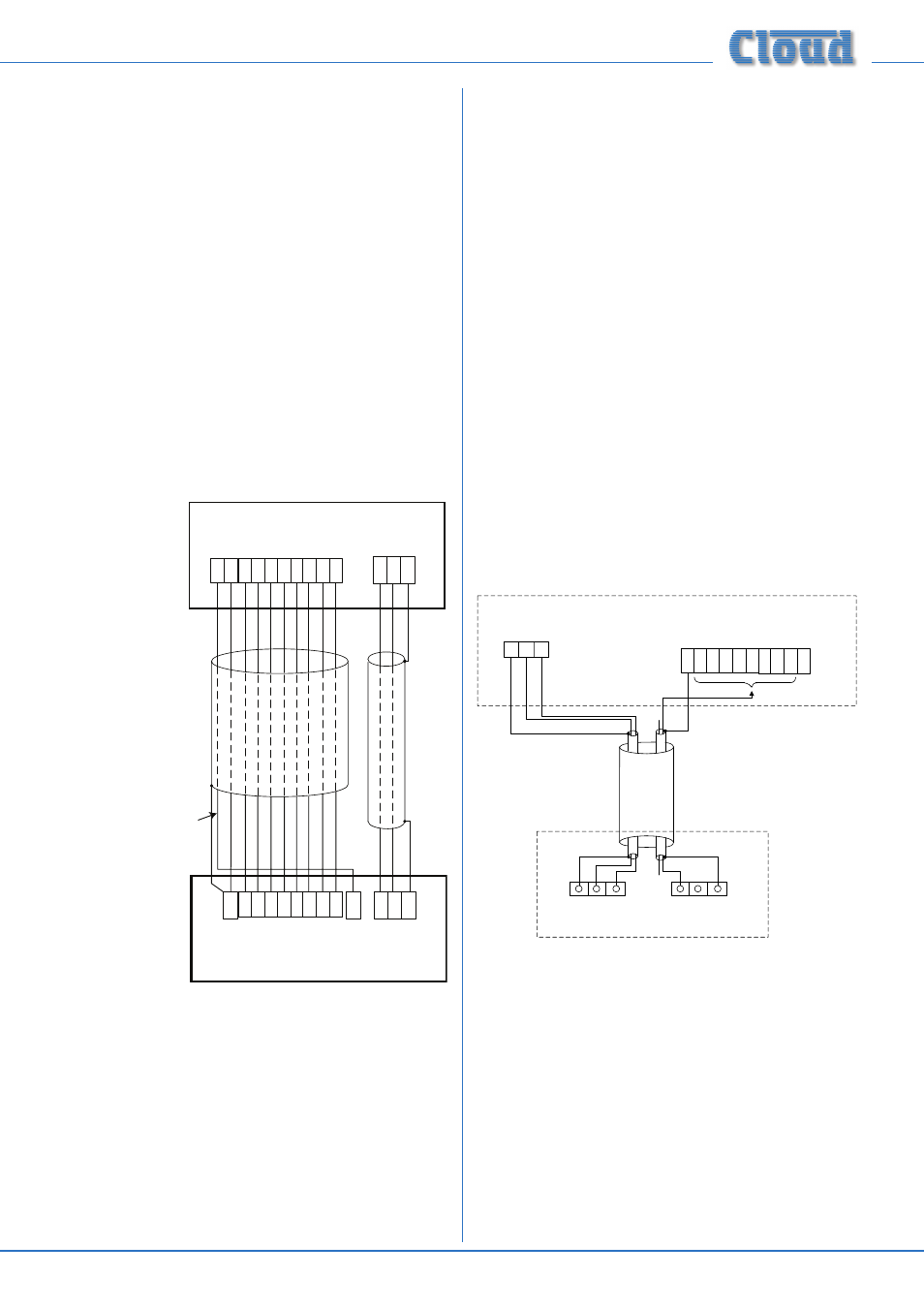Music control, Connecting a pm1 paging mic, Z4-8 – Cloud Electronics Z4MK3 User Manual
Page 13: Or z8, Like many other cloud products, the z8, And z4

Z4-8
MK3
Installation and User Guide
13
Standard two-core screened audio cable may be used for
the audio signal, and stranded multicore cable with an overall
screen for the control cable. The number of cores required in
the latter will be determined by the model of PM microphone
being used and whether the mixer is a Z4
MK3
or Z8
MK3
;
however, note that one additional core will be required if the
PM Series microphone is to be powered from the Zone Mixer.
(Note that SA versions of PM Series microphones cannot be
powered by the Z4MK3 or Z8MK3, and need an external
PSU).
Connections on the PM microphone are made via the rear
cable access glands and screw terminal blocks on the internal
PCB (TERM1, TERM4 and TERM8 in this case). Full connection
details and notes on power supply considerations can be
found in the PM Series Installation and User Guide.
The diagram below shows both the cable connections
between a PM8 and a Z8
MK3
.
Note that the DC power
supply connection will not be required if the PM microphone
is powered by a local PSU.
TERM8
TERM2
TERM1
HOT COLD GND
Z1
Z2
Z3
Z4
Z5
Z6
Z7
Z8
Z1
Z2
Z3
Z4
Z5
Z6
Z7
Z8
Z1
Z2
Z3
Z4
Z5
Z6
Z7
Z8
Z1
Z2
Z3
Z4
Z5
Z6
Z7
Z8
0 V
+ V
PAGING MIC INPUT
ZONE ACCESS
HOT COLD GND
0 V
+ V
PM8 PAGING MICROPHONE
Z8
MK3
MIXER
This connection only required if
the PM Series microphone is to
be powered from the mixer
For individual zone paging as described above, the paging mic
priority trigger should be selected to ‘SW’ by moving J5 on
each zone sub-board. See page 16 for further information.
Connecting a PM1 paging mic
The PM 1 is a simple, passive paging microphone suitable for
situations where announcements are always made to the
same zone(s). It can be connected directly to Z8
MK3
/Z4
MK3
zone mixers, the control cable being wired to the pin(s) of
the Zone Access port corresponding to the zone(s) in which
announcements are required. Any or all of the zones may be
paralleled if multiple zones need to operate from the PM1.
An alternative method for achieving paging to all zones is to
ignore the control cable altogether and set the paging priority
trigger for all zones to VOX. By doing so, it is the presence of
an audio signal from the mic itself that triggers the priority
circuitry. However, if this method is to be employed, the
mating multipin connector must be left plugged into the
PAGING ACCESS control port, with the pins corresponding
to all the zones that the PM1 is to address connected to 0 V.
See page 16 for further information.
Either a single 2-pair individually-screened cable may be
used (this gives the neatest finish), or two separate standard
microphone cables.
Full connection details can be found in
the PM1 Installation and User Guide. Note that the PM1 does
not require DC power.
Connections on the PM1 are made via the rear cable gland in
the base and the screw terminal blocks on the internal PCB
(U2 and U3). Full connection details can be found in the PM1
Installation and User Guide.
The diagram below shows the connections between a PM1
and a Z8
MK3
. Use of 2-pair cable is assumed; the same wiring
principle is adopted if separate cables are being used for audio
and control.
U2 AUDIO
U3 ACCESS
GND
N/C
N/O
HOT
COLD
SCN
Z1
Z2
Z3
Z4
0 V
Z5
Z6
Z7
Z8
+ V
PAGING MIC INPUT
ZONE ACCESS CONNECTOR
CONNECT TO
ZONE(S) IN USE
Z8
MK3
PM1
1
3
2
Music Control
Like many other Cloud products, the Z8
MK3
and Z4
MK3
allow
remote control of music level and source selection in each
zone. Cloud remote control plates from the RL-1 Series
(music level only) and RSL-6 Series (music level and source
selection) provide an elegant solution, though control via a
DC voltage from third-party systems is also possible (see
page 19).
Both types of plate connect via the REMOTE SOURCE &
LEVEL port for the relevant zone (see [13] on page 9).
This connector is a 3-pin 5 mm-pitch screw terminal type.
